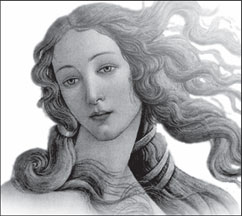|
Vignettes
Are myths at odds with science?
 Greek and Roman mythology shows us the way the human race thought and
felt untold years ago. Through myths we can retrace the path of
civilised man who lives far from nature, to those who lived in close
companionship with nature. Myths lead us back to a time when the world
was young and people had a connection with the earth, trees, seas,
flowers and hills. Manís imagination was alive and not checked by
education. Myths reflect manís view of that beautiful and animated
world. Greek and Roman mythology shows us the way the human race thought and
felt untold years ago. Through myths we can retrace the path of
civilised man who lives far from nature, to those who lived in close
companionship with nature. Myths lead us back to a time when the world
was young and people had a connection with the earth, trees, seas,
flowers and hills. Manís imagination was alive and not checked by
education. Myths reflect manís view of that beautiful and animated
world.
The primitive man had his own share of fears. Death was imminent at
the hand of a wild beast or some unknown disease. His life-span would
have been short. But myths show us how he rose above such fears. He did
not have the intelligence or the desire to create myths. In fact, myths
were the creation of poets. For instance, Greek mythology begins with
Homer who lived about 1,000 years before Jesus Christ. Greek myths show
us how Greeks lived. With the advent of Greek civilisation mankind
became the centre of the universe.
Greek poets created their gods in their own image. Probably, gods
were not in existence before they did so. Before the Greeks, Egyptians
had their own pantheon of gods. However, Egyptians made the shape of
gods deliberately non-human. For instance, among the Egyptian gods and
goddesses, we find a goddess with a catís head and a mysterious sphinx
aloof from all living beings. Egyptian sculptors were bent on creating
gods with birdsí heads or lions with bullsí heads giving rise to a sense
of unreality.
Visible world
|

Roman Goddess Venus
|
Greek sculptors were preoccupied with the visible world. They were
probably influenced by athletes. For instance, Apollo was a god with
human features. Thus Greek poets and sculptors created a heaven on earth
with handsome and strong gods and goddesses. Although the gods were in
human shape Greeks had a reverence for them. They thought gods were very
powerful and dangerous when angry.
It is strange but true that through the veneer of reverence, Greeks
laughed at gods. They ridiculed Zeus who tried to hide his numerous love
affairs from his wife. His wife, Hera, was the typical jealous woman who
used many tricks to put her husband to shame and punish her rivals.
One salutary effect of Greek mythology is that it freed the people
from the paralysing fear of an all powerful god. While the primitive man
worshipped everything he did not understand mountains, rivers, the sun
and huge trees. Greeks were rational enough to reject such beliefs.
Despite the rationality, Greeks myths remain fantastic.
Supernatural powers
The characters in Greek myths had no supernatural powers. There were
no wizards or witches as in fairy tales. Although Circe and Medea were
witches, they were women of unsurpassed beauty. On the other hand,
Greeks did not believe that stars influenced their lives. However, they
believed in astronomy which yielded a wealth of knowledge. According to
certain critics, Greek mythologists transformed a world full of terror
into a world of beauty.
In Greek mythology we find stories of gods and goddesses. The myths
had no connection with religion. Some of the myths tried to explain
natural phenomena such as thunder and lightning.
Greeks believed that they were caused when Zeus hurled his
thunderbolt. Similarly, a volcano erupted because a terrible creature
imprisoned in the mountain was struggling to free himself.
Some Greek myths such as the Golden Fleece are meant only for
entertainment. According to Greek mythology, the universe was not
created by an all powerful god or a pantheon of gods. The ancient Greeks
believed that the universe or the people created gods and goddesses.
Roman deities
The influence of Greek art and literature had a tremendous impact on
Roman deities. Ancient Romans considered that Greek and Roman gods were
the same. However, Romans gave their names to Greek gods. Some of the
Roman gods and goddesses were: Jupiter (Zeus), Juno (Hera), Neptune
(Poseidon), Vesta (Hestia), Mars (Ares), Minerva (Athena), Venus
(Aphrodite), Mercury (Hermes), Diana (Artemis), Vulcan (Hephaestus) and
Ceres (Demeter).
Authors and poets have drawn heavily from Greek and Roman myths. They
keep primitive and modern myths alive through their creations. Although
the Greek contribution to mythology exceeds that of Romans, we are more
familiar with Roman gods and goddesses such as Jupiter, Mars, Minerva,
Venus, Mercury, Diana and Ceres. Most of the myths may not stand the
test of scientific reasoning. However, mythology is something we can
fall back on when science fails to answer our questions.
|


